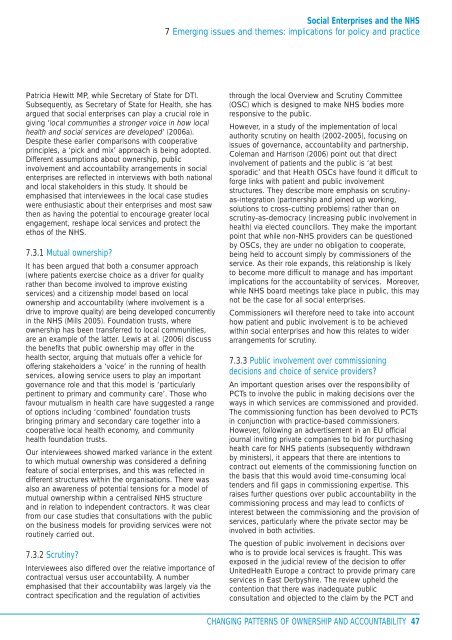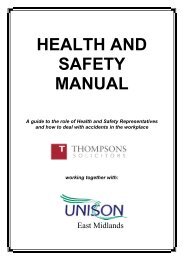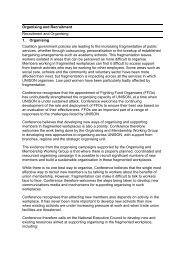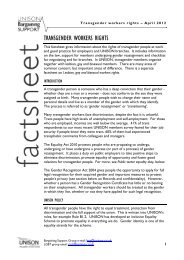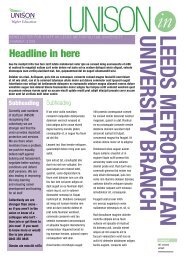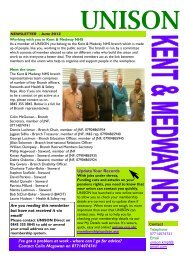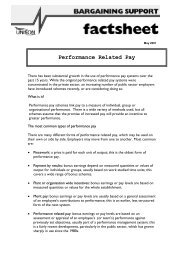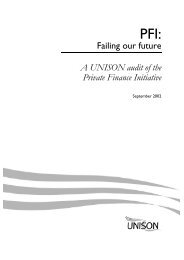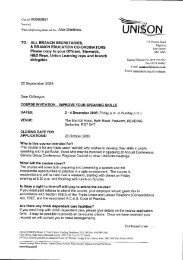Social Enterprises and the NHS - Unison
Social Enterprises and the NHS - Unison
Social Enterprises and the NHS - Unison
You also want an ePaper? Increase the reach of your titles
YUMPU automatically turns print PDFs into web optimized ePapers that Google loves.
Patricia Hewitt MP, while Secretary of State for DTI.<br />
Subsequently, as Secretary of State for Health, she has<br />
argued that social enterprises can play a crucial role in<br />
giving ‘local communities a stronger voice in how local<br />
health <strong>and</strong> social services are developed’ (2006a).<br />
Despite <strong>the</strong>se earlier comparisons with cooperative<br />
principles, a ‘pick <strong>and</strong> mix’ approach is being adopted.<br />
Different assumptions about ownership, public<br />
involvement <strong>and</strong> accountability arrangements in social<br />
enterprises are reflected in interviews with both national<br />
<strong>and</strong> local stakeholders in this study. It should be<br />
emphasised that interviewees in <strong>the</strong> local case studies<br />
were enthusiastic about <strong>the</strong>ir enterprises <strong>and</strong> most saw<br />
<strong>the</strong>n as having <strong>the</strong> potential to encourage greater local<br />
engagement, reshape local services <strong>and</strong> protect <strong>the</strong><br />
ethos of <strong>the</strong> <strong>NHS</strong>.<br />
7.3.1 Mutual ownership?<br />
It has been argued that both a consumer approach<br />
(where patients exercise choice as a driver for quality<br />
ra<strong>the</strong>r than become involved to improve existing<br />
services) <strong>and</strong> a citizenship model based on local<br />
ownership <strong>and</strong> accountability (where involvement is a<br />
drive to improve quality) are being developed concurrently<br />
in <strong>the</strong> <strong>NHS</strong> (Mills 2005). Foundation trusts, where<br />
ownership has been transferred to local communities,<br />
are an example of <strong>the</strong> latter. Lewis at al. (2006) discuss<br />
<strong>the</strong> benefits that public ownership may offer in <strong>the</strong><br />
health sector, arguing that mutuals offer a vehicle for<br />
offering stakeholders a ‘voice’ in <strong>the</strong> running of health<br />
services, allowing service users to play an important<br />
governance role <strong>and</strong> that this model is ‘particularly<br />
pertinent to primary <strong>and</strong> community care’. Those who<br />
favour mutualism in health care have suggested a range<br />
of options including ‘combined’ foundation trusts<br />
bringing primary <strong>and</strong> secondary care toge<strong>the</strong>r into a<br />
cooperative local health economy, <strong>and</strong> community<br />
health foundation trusts.<br />
Our interviewees showed marked variance in <strong>the</strong> extent<br />
to which mutual ownership was considered a defining<br />
feature of social enterprises, <strong>and</strong> this was reflected in<br />
different structures within <strong>the</strong> organisations. There was<br />
also an awareness of potential tensions for a model of<br />
mutual ownership within a centralised <strong>NHS</strong> structure<br />
<strong>and</strong> in relation to independent contractors. It was clear<br />
from our case studies that consultations with <strong>the</strong> public<br />
on <strong>the</strong> business models for providing services were not<br />
routinely carried out.<br />
7.3.2 Scrutiny?<br />
Interviewees also differed over <strong>the</strong> relative importance of<br />
contractual versus user accountability. A number<br />
emphasised that <strong>the</strong>ir accountability was largely via <strong>the</strong><br />
contract specification <strong>and</strong> <strong>the</strong> regulation of activities<br />
<strong>Social</strong> <strong>Enterprises</strong> <strong>and</strong> <strong>the</strong> <strong>NHS</strong><br />
7 Emerging issues <strong>and</strong> <strong>the</strong>mes: implications for policy <strong>and</strong> practice<br />
through <strong>the</strong> local Overview <strong>and</strong> Scrutiny Committee<br />
(OSC) which is designed to make <strong>NHS</strong> bodies more<br />
responsive to <strong>the</strong> public.<br />
However, in a study of <strong>the</strong> implementation of local<br />
authority scrutiny on health (2002-2005), focusing on<br />
issues of governance, accountability <strong>and</strong> partnership,<br />
Coleman <strong>and</strong> Harrison (2006) point out that direct<br />
involvement of patients <strong>and</strong> <strong>the</strong> public is ‘at best<br />
sporadic’ <strong>and</strong> that Health OSCs have found it difficult to<br />
forge links with patient <strong>and</strong> public involvement<br />
structures. They describe more emphasis on scrutinyas-integration<br />
(partnership <strong>and</strong> joined up working,<br />
solutions to cross-cutting problems) ra<strong>the</strong>r than on<br />
scrutiny-as-democracy (increasing public involvement in<br />
health) via elected councillors. They make <strong>the</strong> important<br />
point that while non-<strong>NHS</strong> providers can be questioned<br />
by OSCs, <strong>the</strong>y are under no obligation to cooperate,<br />
being held to account simply by commissioners of <strong>the</strong><br />
service. As <strong>the</strong>ir role exp<strong>and</strong>s, this relationship is likely<br />
to become more difficult to manage <strong>and</strong> has important<br />
implications for <strong>the</strong> accountability of services. Moreover,<br />
while <strong>NHS</strong> board meetings take place in public, this may<br />
not be <strong>the</strong> case for all social enterprises.<br />
Commissioners will <strong>the</strong>refore need to take into account<br />
how patient <strong>and</strong> public involvement is to be achieved<br />
within social enterprises <strong>and</strong> how this relates to wider<br />
arrangements for scrutiny.<br />
7.3.3 Public involvement over commissioning<br />
decisions <strong>and</strong> choice of service providers?<br />
An important question arises over <strong>the</strong> responsibility of<br />
PCTs to involve <strong>the</strong> public in making decisions over <strong>the</strong><br />
ways in which services are commissioned <strong>and</strong> provided.<br />
The commissioning function has been devolved to PCTs<br />
in conjunction with practice-based commissioners.<br />
However, following an advertisement in an EU official<br />
journal inviting private companies to bid for purchasing<br />
health care for <strong>NHS</strong> patients (subsequently withdrawn<br />
by ministers), it appears that <strong>the</strong>re are intentions to<br />
contract out elements of <strong>the</strong> commissioning function on<br />
<strong>the</strong> basis that this would avoid time-consuming local<br />
tenders <strong>and</strong> fill gaps in commissioning expertise. This<br />
raises fur<strong>the</strong>r questions over public accountability in <strong>the</strong><br />
commissioning process <strong>and</strong> may lead to conflicts of<br />
interest between <strong>the</strong> commissioning <strong>and</strong> <strong>the</strong> provision of<br />
services, particularly where <strong>the</strong> private sector may be<br />
involved in both activities.<br />
The question of public involvement in decisions over<br />
who is to provide local services is fraught. This was<br />
exposed in <strong>the</strong> judicial review of <strong>the</strong> decision to offer<br />
UnitedHealth Europe a contract to provide primary care<br />
services in East Derbyshire. The review upheld <strong>the</strong><br />
contention that <strong>the</strong>re was inadequate public<br />
consultation <strong>and</strong> objected to <strong>the</strong> claim by <strong>the</strong> PCT <strong>and</strong><br />
CHANGING PATTERNS OF OWNERSHIP AND ACCOUNTABILITY 47


